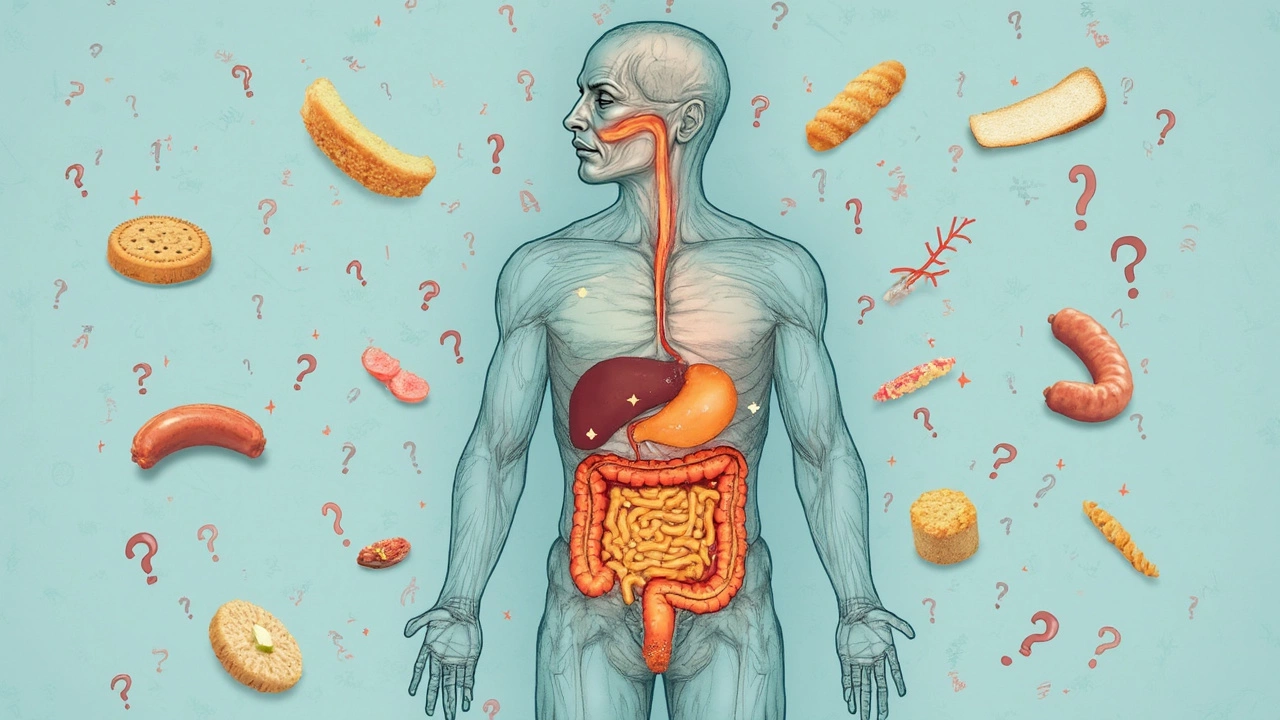Accidentally eating gluten is way more common than people think. Maybe you ordered fries at a restaurant and forgot to ask if they use shared oil. Suddenly your stomach’s in knots and your head’s foggy. So what's next? A lot of folks start searching for quick fixes or 'gluten flush' hacks, hoping for a miracle detox. Honestly, there's no button to hit or magic smoothie that pushes gluten out overnight.
But you’re not powerless. Understanding how your body reacts helps a ton. And while you can’t literally flush gluten out like chugging water after too much salt, there’s still a lot you can do to recover and feel normal again. We're talking smart food swaps, things to avoid, and easy steps you can take to help your gut heal faster. Skip the myths you’ll find online—you want straight-up advice that actually helps.
- What Happens When You Eat Gluten?
- Myths vs. Facts: Can You Really Flush Out Gluten?
- Real Recovery Steps & Tips
- Everyday Prevention Tricks
What Happens When You Eat Gluten?
Accidentally eating gluten can throw your whole day off, especially if you have celiac disease or gluten sensitivity. Here’s the straight deal: gluten isn’t poisonous, but your body reacts like it’s dealing with an invader. In celiac disease, even a crumb can cause your immune system to attack your gut. If you’re just sensitive, you might deal with a mix of bloating, brain fog, aches, or stomach cramps.
Symptoms can hit anywhere from a few minutes to a few hours after eating gluten. For some folks, it only takes a tiny bit (about 50mg, which is less than a slice of bread) to cause trouble. The reaction and how long it lasts is different for everyone.
"In people with celiac disease, eating gluten damages the small intestine and leads to long-term problems if not managed, even if symptoms aren’t obvious." – Celiac Disease Foundation
Your immune system’s overreaction isn’t immediate. It’s actually a chain reaction that starts in the gut and can trigger headaches, joint pain, fatigue, or skin rashes. Some people feel wiped out for a couple of days. Others may only get mild digestive issues.
| Common Symptoms After Eating Gluten | How Long They Last |
|---|---|
| Bloating, gas, diarrhea | Hours to days |
| Headaches, brain fog | Several hours to two days |
| Skin rashes or itching | Days to a week |
| Fatigue | Six hours to two days |
So, when you suspect you got glutened, it’s not about flushing out a toxin—it’s your immune system trying to calm down and heal. The best thing you can do? Listen to your body and know that bouncing back might take some time. Armed with this info, you can make better calls about what to do next (hint: it isn’t drinking gallons of water or doing strange detoxes).
Myths vs. Facts: Can You Really Flush Out Gluten?
We've all heard rumors about special drinks, supplements, and even weird detox tricks that claim to flush gluten out of your system. Here's the truth: your body has to deal with gluten like it does any other protein you eat. No amount of water, apple cider vinegar, or celery juice will magically sweep it away.
After a gluten slip-up, the gluten has to run its course through your digestive system. This usually takes about one to three days, depending on how sensitive you are and how much you ate. There are no shortcuts. Your digestive enzymes break down gluten the best they can; then your body just eliminates the leftover waste naturally. As Dr. Alessio Fasano, a leading celiac specialist, puts it:
"There is no known way to speed up the elimination of gluten from the body. Recovery is mostly about symptom management and giving your gut time to heal."
- Gluten detox pills or drinks? Nope—they don't work. Save your money and skip the scams.
- Drinking tons of water might help you feel less bloated, but it does not push gluten out any faster.
- Activated charcoal and similar products do not bind to gluten or remove it from your body.
Here's a quick look at how long gluten might stay in your body once consumed:
| What Happens | Time Frame |
|---|---|
| Gluten starts breaking down in the stomach | 0-4 hours |
| Moves through the intestines, symptoms peak | 4-24 hours |
| Gluten fully eliminated (most people) | 1-3 days |
The only real way to avoid gluten reactions is to avoid gluten in the first place. If you slip up, focus on treating your symptoms rather than looking for a quick gluten detox. Giving your body rest, eating safe foods, and letting time do its thing is honestly the best plan.

Real Recovery Steps & Tips
So you got glutened. Now what? First thing: stop stressing about “flushing” gluten out of your body. Your body is already working to get rid of what it doesn’t need, but some people feel symptoms for days. That’s totally normal for anyone who’s sensitive or has Celiac disease.
Here are some real, proven ways to get back on your feet faster. No magic here, just practical stuff you can do:
- Hydrate Like Crazy: Water helps your body process everything faster. It won’t get rid of gluten directly, but it keeps your gut moving and can ease headaches, bloating, and fatigue.
- Eat Easy-to-Digest Foods: Skip heavy, greasy stuff and stick with plain rice, bananas, applesauce, potatoes, and chicken. Think basic and boring—it actually helps.
- Rest Is Key: Your immune system is working overtime. Get extra sleep if you can, even if it means sneaking in naps during the day. Your gut heals fastest when you’re resting.
- Try a Gut-Soothing Tea: Peppermint or ginger tea can sometimes ease cramps and nausea. They won’t “flush” gluten but can make you feel human again.
- Go for a Walk: Light movement like walking can help reduce bloating and get digestion moving—too much exercise, though, and you’ll feel worse.
- Consider Probiotics: Some people find that a good probiotic eases stomach issues after accidental gluten exposure. Pick one with multiple strains for best results.
Here’s a quick look at common symptoms and how long they can hang around if you get glutened:
| Symptom | Typical Duration |
|---|---|
| Bloating | 1-3 days |
| Headache | 1-2 days |
| Brain fog | 1-3 days |
| Fatigue | up to a week |
| Digestive upset | up to a week |
Don’t pop random supplements, enzymes, or charcoal pills—there’s zero actual science showing these help after gluten exposure. Stick with what’s proven and take it easy on your gut.
If things get much worse, or you start getting dehydrated from vomiting or diarrhea, it’s time to call your doctor. Most of the time, recovery just takes patience and listening to what your body needs.
Everyday Prevention Tricks
If you want to keep gluten slip-ups out of your life, you’ve got to get practical. Start simple and stick with it: the less stress, the better.
First up, always check food labels—yes, even if it’s a brand you trust. Companies change recipes all the time, and sometimes gluten sneaks in with things like modified food starch or malt flavoring. Look for certified gluten free stamps or use phone apps that scan barcodes and flag risky ingredients.
Cross-contamination can be a deal-breaker. One little crumb from regular bread in your peanut butter jar can mess you up. Create a gluten-free zone in your kitchen with dedicated tools—separate toasters, cutting boards, and utensils are a must. If you live with others, label your stuff. People roll their eyes, but your gut will thank you.
Eating out? Always ask about how food is prepped. Even fries can get hit with gluten if they’re using the same fryer for breaded chicken. Get friendly with restaurant staff and speak up—at least half of gluten issues in restaurants come from shared cooking surfaces or misunderstood ingredient lists, according to a 2024 survey from Gluten Intolerance Group.
| Food/Product | Watch Out For |
|---|---|
| Soy Sauce | Most contain wheat unless labeled "gluten free" |
| Broth & Soup Mixes | Hidden thickeners made from wheat |
| Processed Lunch Meats | Fillers or flavorings with gluten |
| Candy | Barley malt or wheat-based glucose syrup |
Pack snacks just in case. Low blood sugar plus no safe food can lead to risky choices. Toss gluten free granola bars or nuts in your bag for backup.
Finally, get in the habit of sharing your needs. It’s not oversharing—it’s making sure people don’t unknowingly offer you something risky. The awkward two-minute chat is way better than a week of symptoms.
There’s no way to live 'on high alert' 24/7, but a few solid tricks make it way easier to keep gluten at bay in your daily routine.

